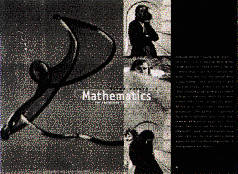|
|
 
Karen Uhlenbeck |
|
|
 
Karen Uhlenbeck |
 Karen Uhlenbeck, who has been called variously a differential geometer, non-linear analyst, and differential topologist, is not only considered an eminent mathematician, she is also recognized as an expert in theoretical physics: by studying the fundamental properties of matter in the universe, she is helping to expand Einstein's theory of relativity. She describes her position on the border of two disciplines in this way: "Very rarely does a physicist come to a mathematician with a question that the mathematician can answer. Instead, the mathematician sees the mess that the physicist uses and tries to figure it out." "Cleaning up the mess" means in Uhlenbeck's case delving into the world of subatomic particles to study complicated relationships among four dimensions (height, length, width, and time), using Maxwell's equations for electromagnetism.
Karen Uhlenbeck, who has been called variously a differential geometer, non-linear analyst, and differential topologist, is not only considered an eminent mathematician, she is also recognized as an expert in theoretical physics: by studying the fundamental properties of matter in the universe, she is helping to expand Einstein's theory of relativity. She describes her position on the border of two disciplines in this way: "Very rarely does a physicist come to a mathematician with a question that the mathematician can answer. Instead, the mathematician sees the mess that the physicist uses and tries to figure it out." "Cleaning up the mess" means in Uhlenbeck's case delving into the world of subatomic particles to study complicated relationships among four dimensions (height, length, width, and time), using Maxwell's equations for electromagnetism.
Uhlenbeck grew up in the country in New Jersey, where she spent her time reading and appreciating nature. She didn't become interested in math until half-way through college when she took an exciting junior-level math course at the University of Michigan and declared this her major, receiving her bachelor's in1964. She earned her doctorate from Brandeis in 1968. After a series of short-term teaching appointments (a year at MIT, two years at U.C. Berkeley), when Uhlenbeck began looking for a tenure-track job, she recognized for the first time the reality of gender discrimation; it was hard for her to find a permenant, full-time position since the assumption was that "women have babies, not careers". This recognition of gender discrimination continues to inform Uhlenbeck's career. Having benefited immensely from her relationship with another prominent female mathematician, Leslie Sibner, who has served as Uhlenbeck's mentor, role model, and adviser, Uhlenbeck takes her own position as a role model seriously, participating in a mentoring program for undergraduates. She has received numerous awards including the prestigious MacArthur fellowship, and has been elected to such important organizations as the American Academy of Arts and Science in 1983 and the National Academy of Sciences in 1986. She is currently a professor at the University of Texas at Austin where she holds the Richardson Foundations Regents Chair in mathematics. Source: biography by Lyn Taylor, in Notable Women in Mathematics: A Biographical Dictionary, ed. Charlene Morrow and Teri Perl. Westport, Connecticut: Greenwood Press, 1998.
|